Data Analytics Manager Resume Examples

Jul 18, 2024
|
12 min read
Nail Your Data Analytics Manager Resume: Tips to Crunch the Job Hunt Numbers
Rated by 348 people
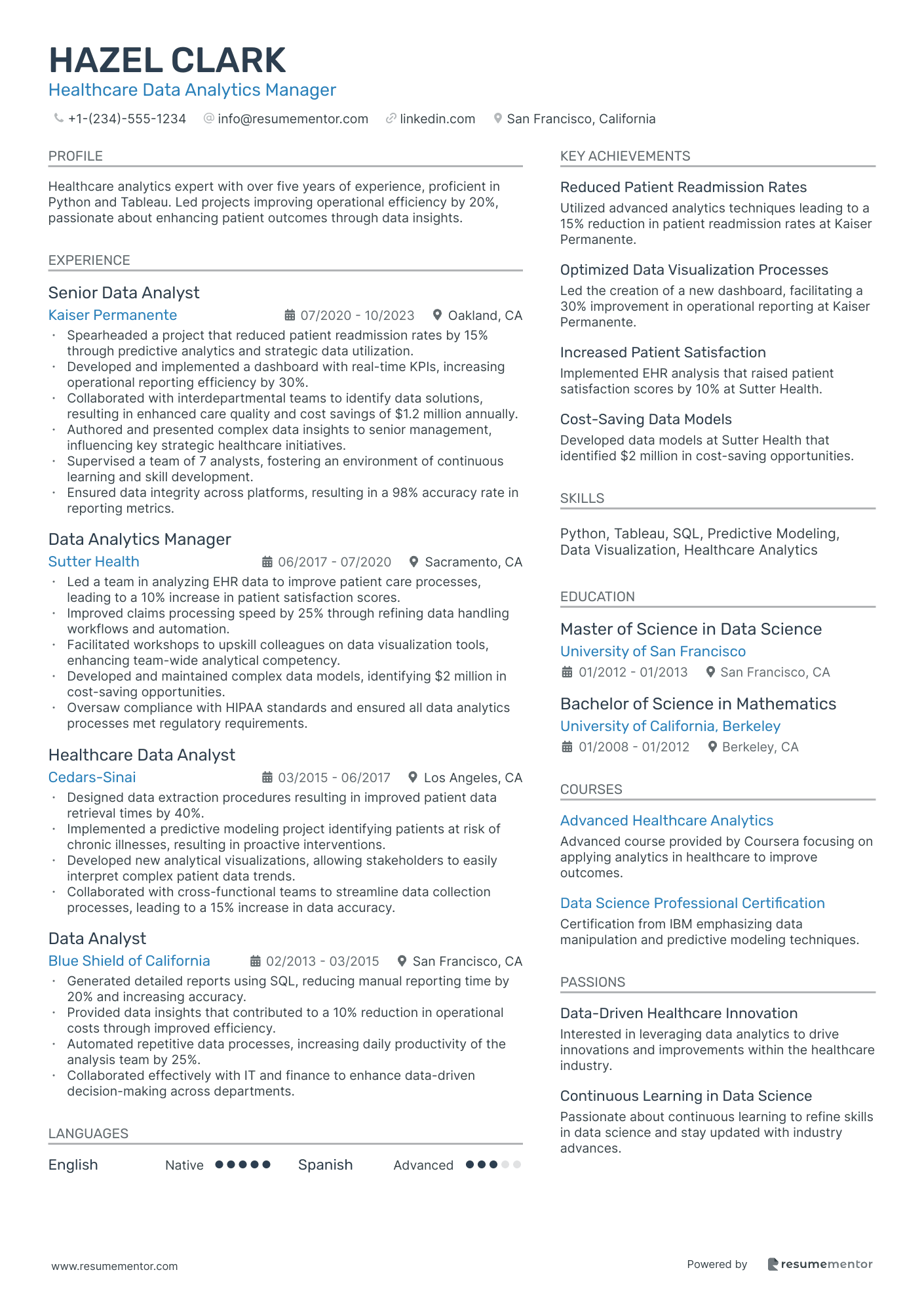
Healthcare Data Analytics Manager
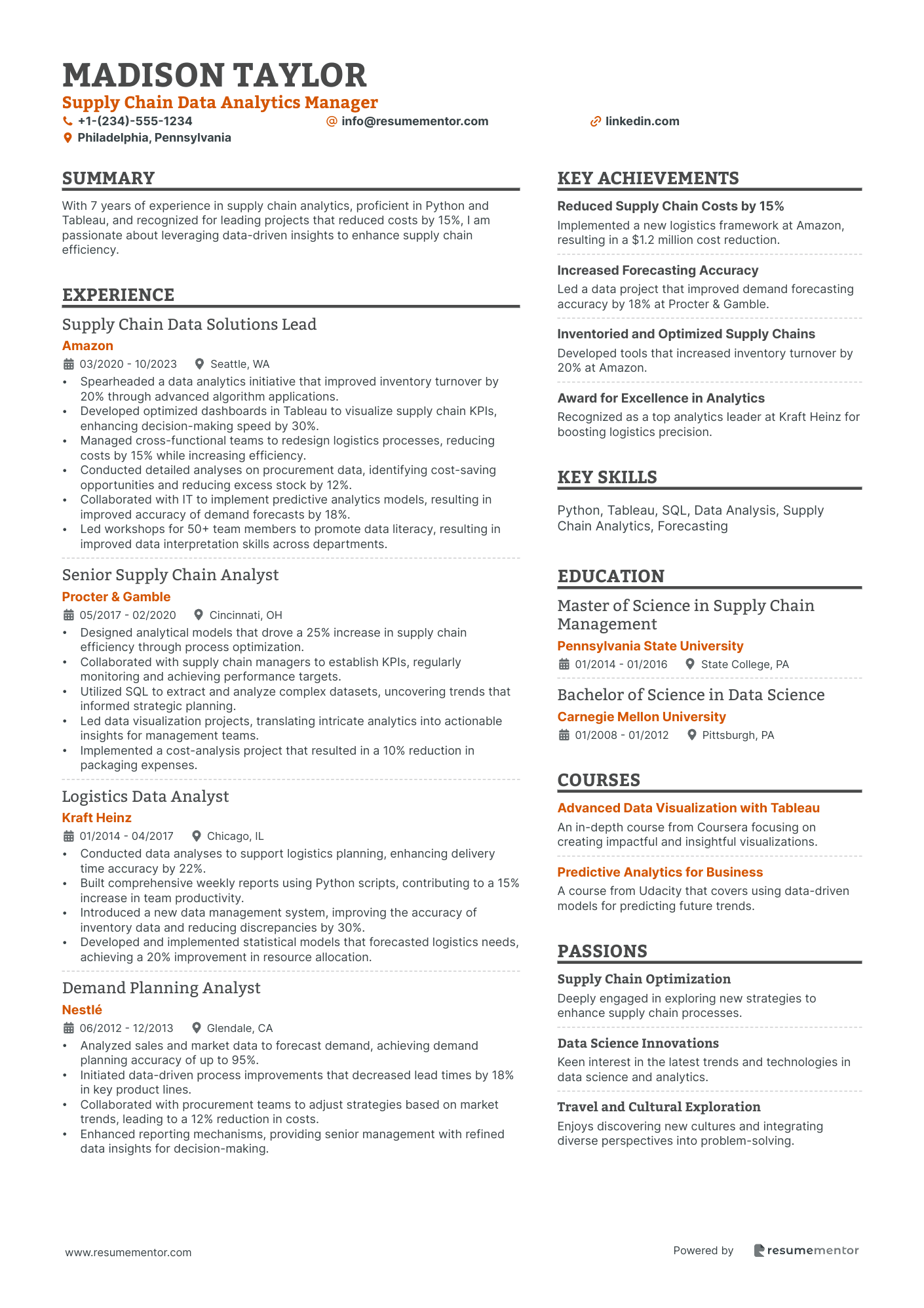
Supply Chain Data Analytics Manager
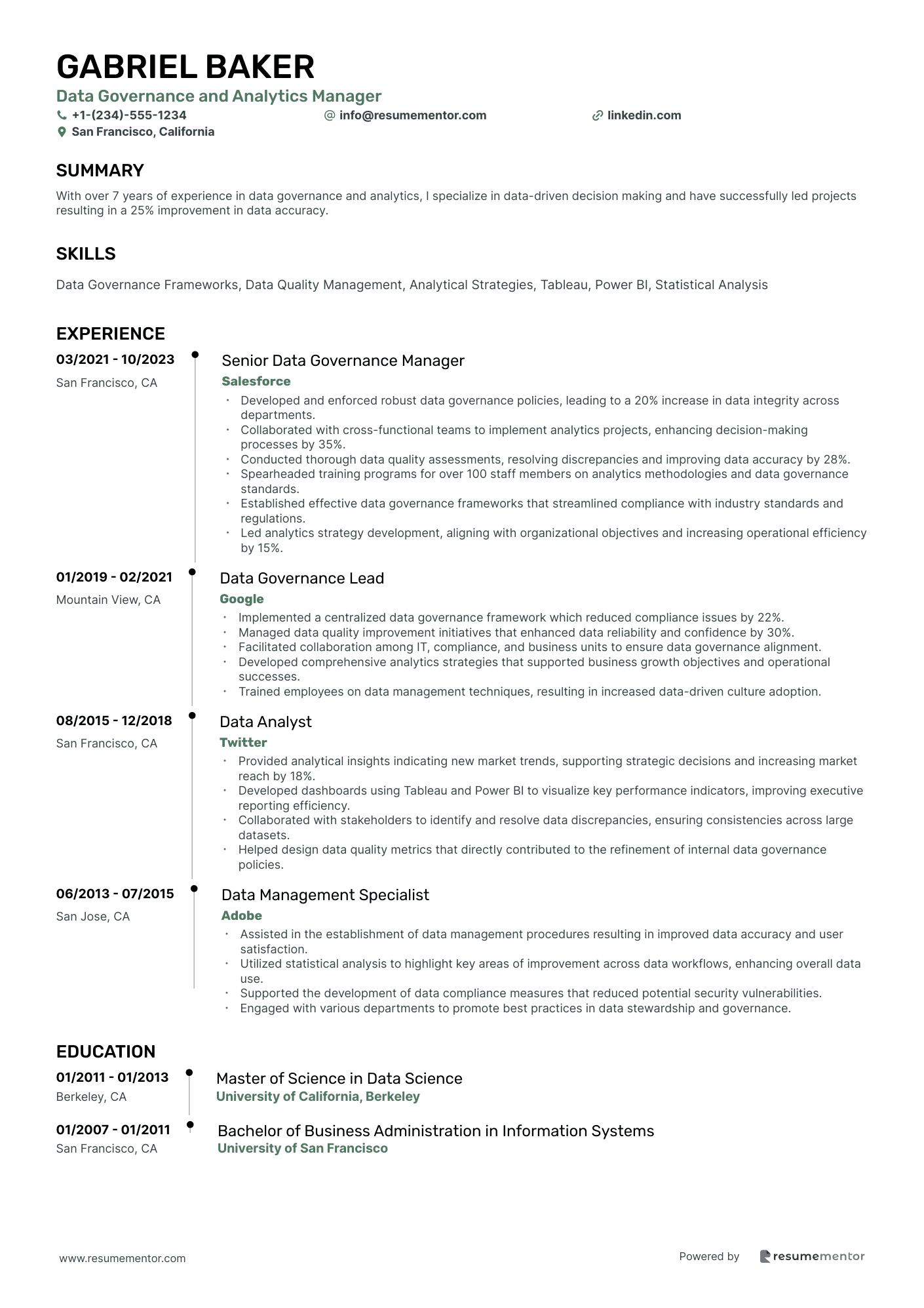
Data Governance and Analytics Manager
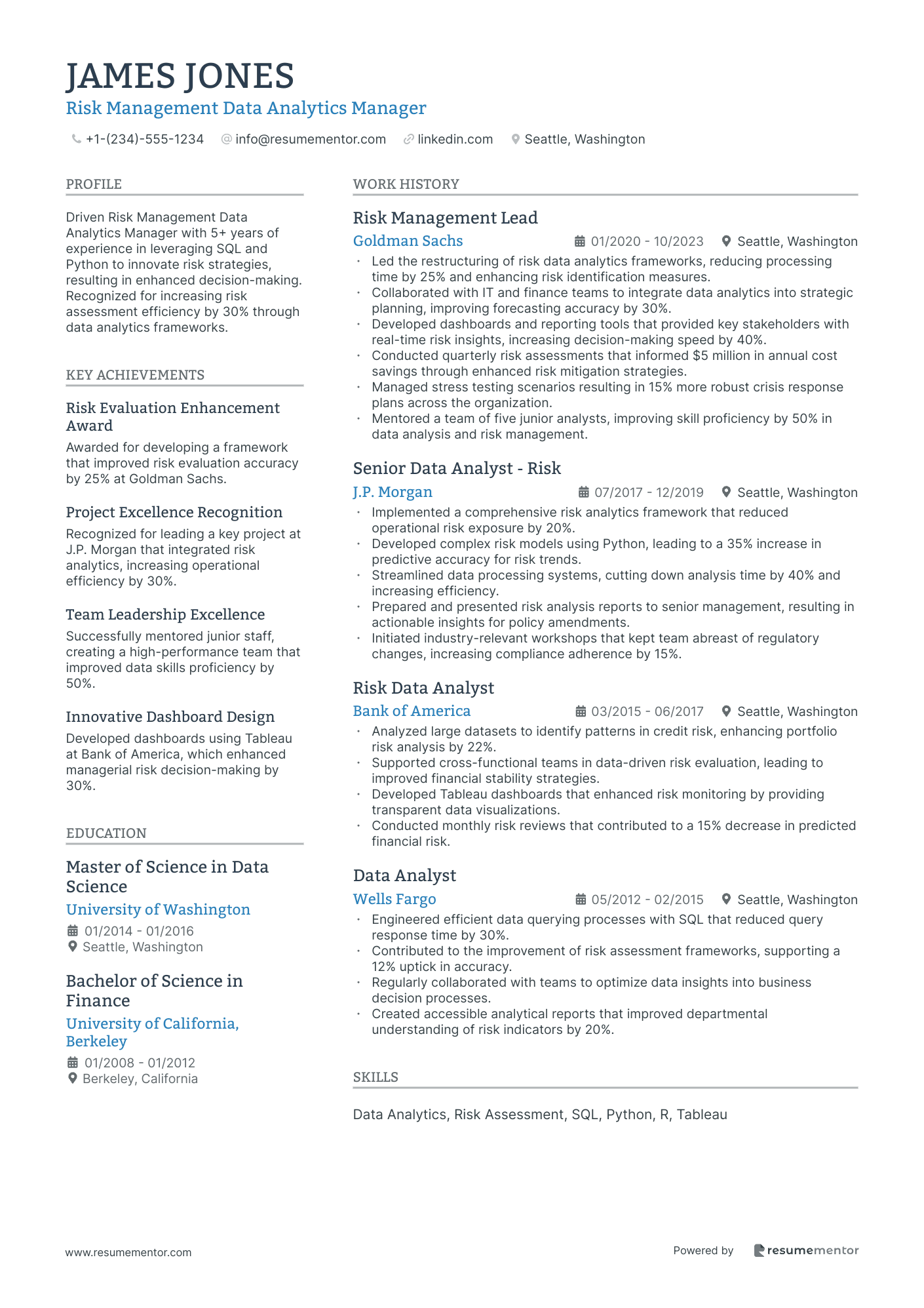
Risk Management Data Analytics Manager
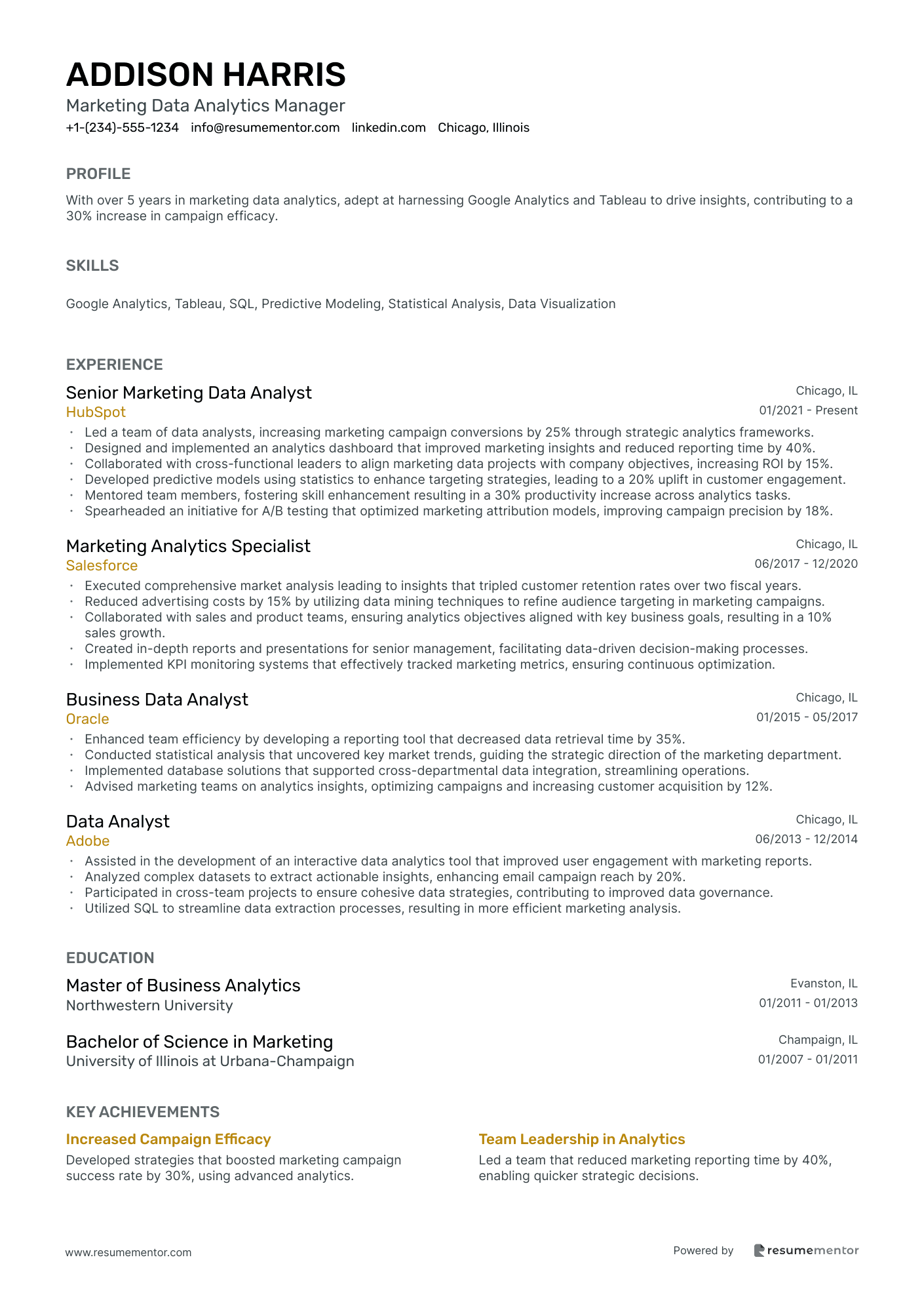
Marketing Data Analytics Manager
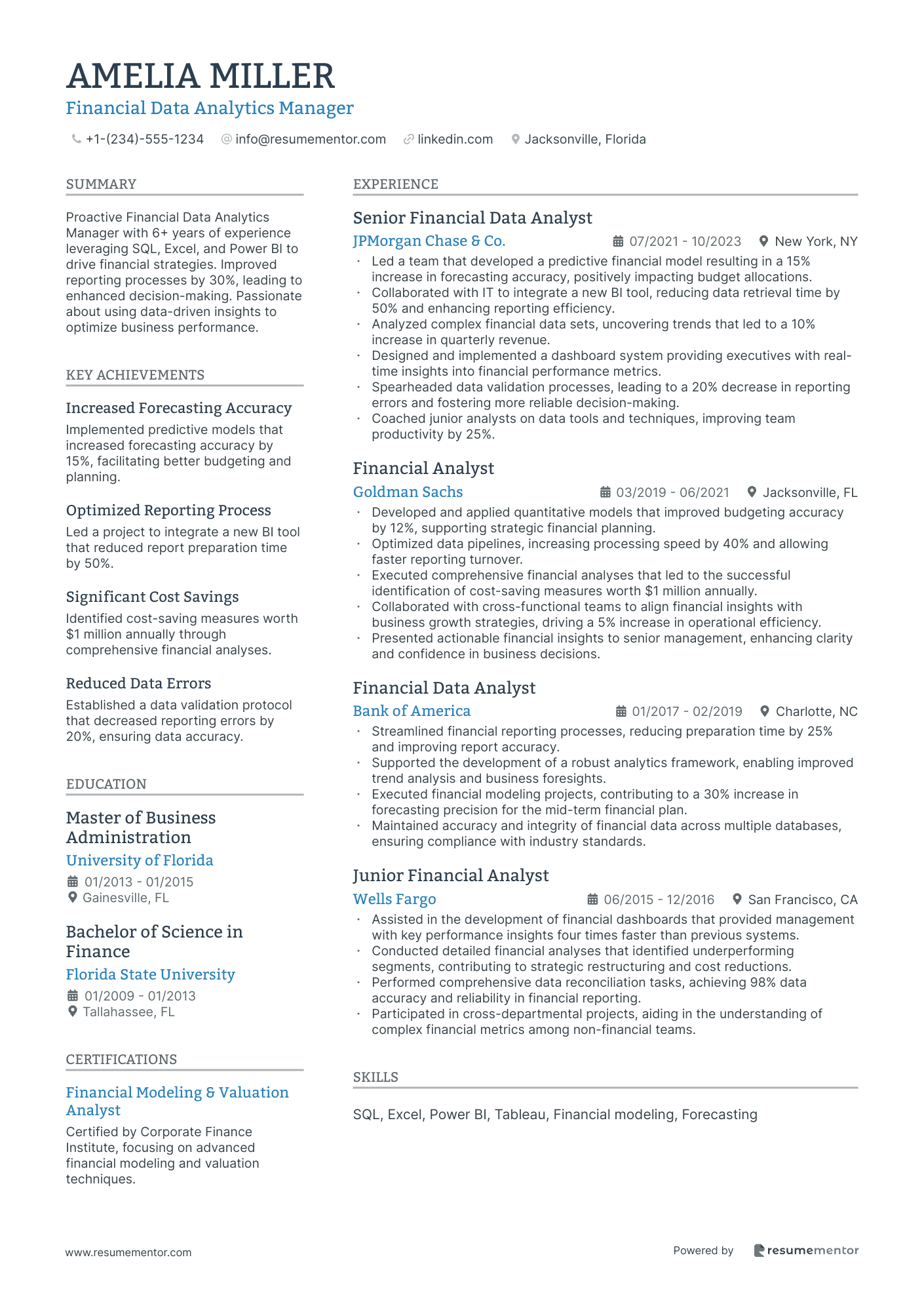
Financial Data Analytics Manager
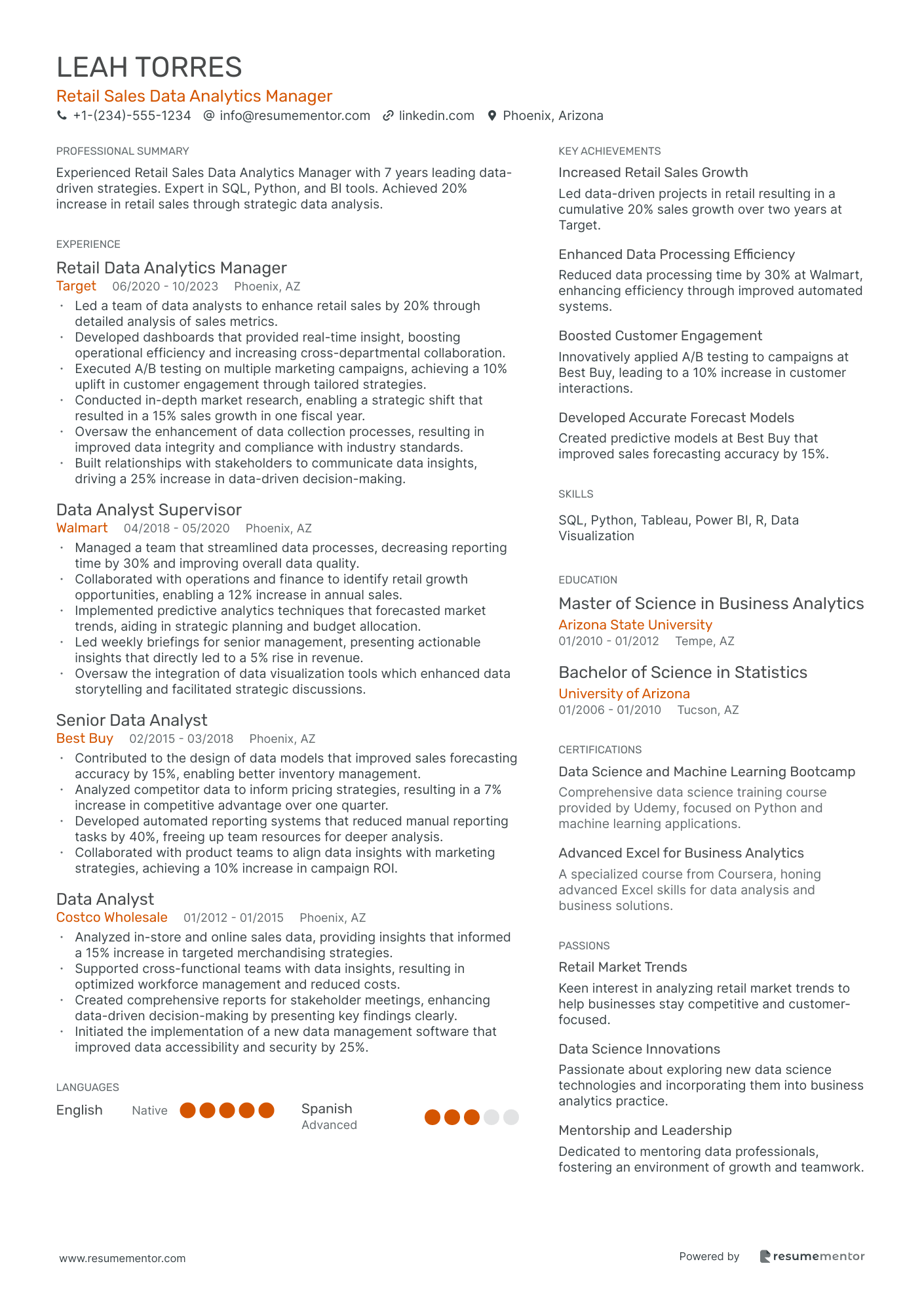
Retail Sales Data Analytics Manager
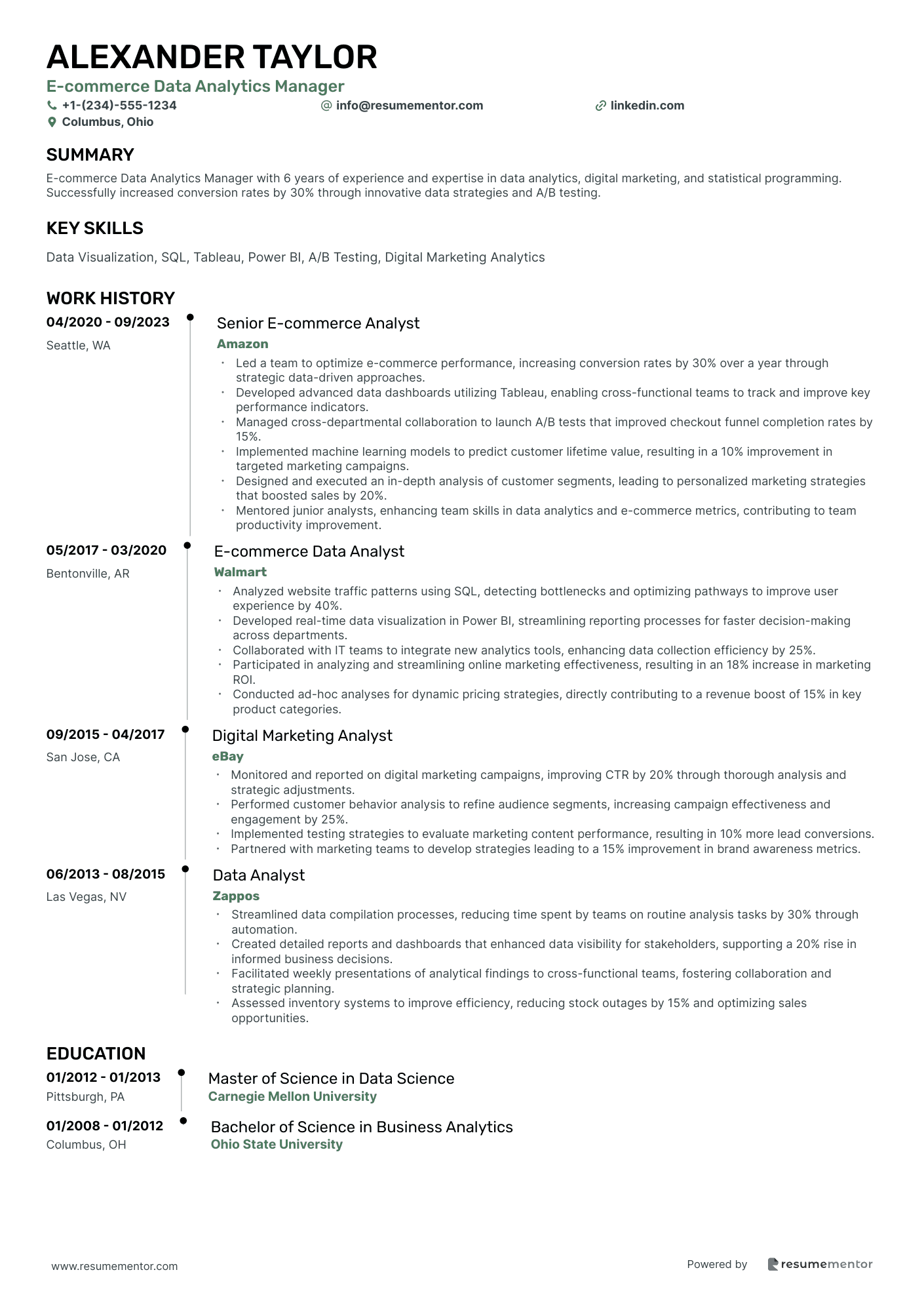
E-commerce Data Analytics Manager
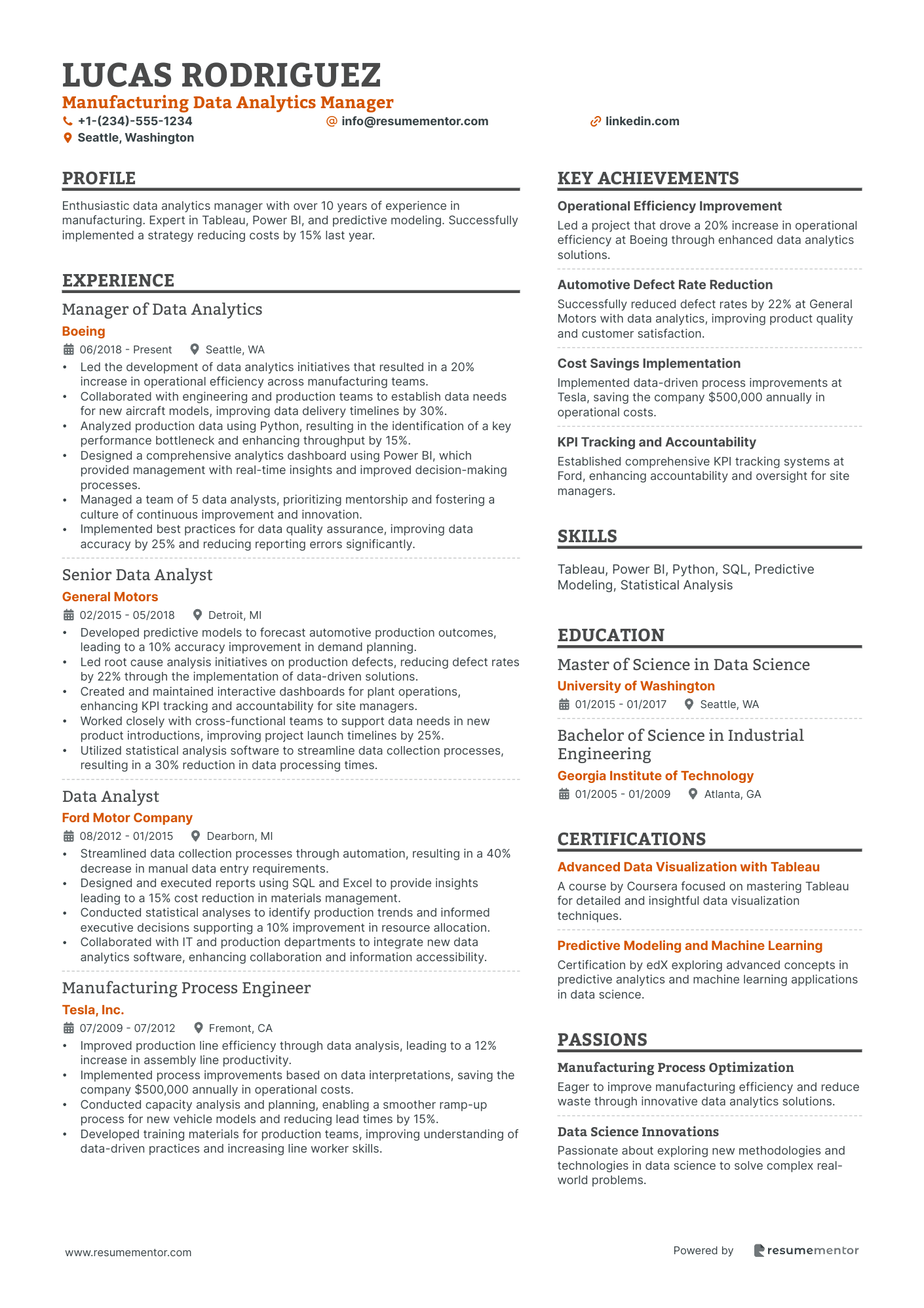
Manufacturing Data Analytics Manager

Healthcare Data Analytics Manager resume sample
- •Spearheaded a project that reduced patient readmission rates by 15% through predictive analytics and strategic data utilization.
- •Developed and implemented a dashboard with real-time KPIs, increasing operational reporting efficiency by 30%.
- •Collaborated with interdepartmental teams to identify data solutions, resulting in enhanced care quality and cost savings of $1.2 million annually.
- •Authored and presented complex data insights to senior management, influencing key strategic healthcare initiatives.
- •Supervised a team of 7 analysts, fostering an environment of continuous learning and skill development.
- •Ensured data integrity across platforms, resulting in a 98% accuracy rate in reporting metrics.
- •Led a team in analyzing EHR data to improve patient care processes, leading to a 10% increase in patient satisfaction scores.
- •Improved claims processing speed by 25% through refining data handling workflows and automation.
- •Facilitated workshops to upskill colleagues on data visualization tools, enhancing team-wide analytical competency.
- •Developed and maintained complex data models, identifying $2 million in cost-saving opportunities.
- •Oversaw compliance with HIPAA standards and ensured all data analytics processes met regulatory requirements.
- •Designed data extraction procedures resulting in improved patient data retrieval times by 40%.
- •Implemented a predictive modeling project identifying patients at risk of chronic illnesses, resulting in proactive interventions.
- •Developed new analytical visualizations, allowing stakeholders to easily interpret complex patient data trends.
- •Collaborated with cross-functional teams to streamline data collection processes, leading to a 15% increase in data accuracy.
- •Generated detailed reports using SQL, reducing manual reporting time by 20% and increasing accuracy.
- •Provided data insights that contributed to a 10% reduction in operational costs through improved efficiency.
- •Automated repetitive data processes, increasing daily productivity of the analysis team by 25%.
- •Collaborated effectively with IT and finance to enhance data-driven decision-making across departments.
Supply Chain Data Analytics Manager resume sample
- •Spearheaded a data analytics initiative that improved inventory turnover by 20% through advanced algorithm applications.
- •Developed optimized dashboards in Tableau to visualize supply chain KPIs, enhancing decision-making speed by 30%.
- •Managed cross-functional teams to redesign logistics processes, reducing costs by 15% while increasing efficiency.
- •Conducted detailed analyses on procurement data, identifying cost-saving opportunities and reducing excess stock by 12%.
- •Collaborated with IT to implement predictive analytics models, resulting in improved accuracy of demand forecasts by 18%.
- •Led workshops for 50+ team members to promote data literacy, resulting in improved data interpretation skills across departments.
- •Designed analytical models that drove a 25% increase in supply chain efficiency through process optimization.
- •Collaborated with supply chain managers to establish KPIs, regularly monitoring and achieving performance targets.
- •Utilized SQL to extract and analyze complex datasets, uncovering trends that informed strategic planning.
- •Led data visualization projects, translating intricate analytics into actionable insights for management teams.
- •Implemented a cost-analysis project that resulted in a 10% reduction in packaging expenses.
- •Conducted data analyses to support logistics planning, enhancing delivery time accuracy by 22%.
- •Built comprehensive weekly reports using Python scripts, contributing to a 15% increase in team productivity.
- •Introduced a new data management system, improving the accuracy of inventory data and reducing discrepancies by 30%.
- •Developed and implemented statistical models that forecasted logistics needs, achieving a 20% improvement in resource allocation.
- •Analyzed sales and market data to forecast demand, achieving demand planning accuracy of up to 95%.
- •Initiated data-driven process improvements that decreased lead times by 18% in key product lines.
- •Collaborated with procurement teams to adjust strategies based on market trends, leading to a 12% reduction in costs.
- •Enhanced reporting mechanisms, providing senior management with refined data insights for decision-making.
Data Governance and Analytics Manager resume sample
- •Developed and enforced robust data governance policies, leading to a 20% increase in data integrity across departments.
- •Collaborated with cross-functional teams to implement analytics projects, enhancing decision-making processes by 35%.
- •Conducted thorough data quality assessments, resolving discrepancies and improving data accuracy by 28%.
- •Spearheaded training programs for over 100 staff members on analytics methodologies and data governance standards.
- •Established effective data governance frameworks that streamlined compliance with industry standards and regulations.
- •Led analytics strategy development, aligning with organizational objectives and increasing operational efficiency by 15%.
- •Implemented a centralized data governance framework which reduced compliance issues by 22%.
- •Managed data quality improvement initiatives that enhanced data reliability and confidence by 30%.
- •Facilitated collaboration among IT, compliance, and business units to ensure data governance alignment.
- •Developed comprehensive analytics strategies that supported business growth objectives and operational successes.
- •Trained employees on data management techniques, resulting in increased data-driven culture adoption.
- •Provided analytical insights indicating new market trends, supporting strategic decisions and increasing market reach by 18%.
- •Developed dashboards using Tableau and Power BI to visualize key performance indicators, improving executive reporting efficiency.
- •Collaborated with stakeholders to identify and resolve data discrepancies, ensuring consistencies across large datasets.
- •Helped design data quality metrics that directly contributed to the refinement of internal data governance policies.
- •Assisted in the establishment of data management procedures resulting in improved data accuracy and user satisfaction.
- •Utilized statistical analysis to highlight key areas of improvement across data workflows, enhancing overall data use.
- •Supported the development of data compliance measures that reduced potential security vulnerabilities.
- •Engaged with various departments to promote best practices in data stewardship and governance.
Risk Management Data Analytics Manager resume sample
- •Led the restructuring of risk data analytics frameworks, reducing processing time by 25% and enhancing risk identification measures.
- •Collaborated with IT and finance teams to integrate data analytics into strategic planning, improving forecasting accuracy by 30%.
- •Developed dashboards and reporting tools that provided key stakeholders with real-time risk insights, increasing decision-making speed by 40%.
- •Conducted quarterly risk assessments that informed $5 million in annual cost savings through enhanced risk mitigation strategies.
- •Managed stress testing scenarios resulting in 15% more robust crisis response plans across the organization.
- •Mentored a team of five junior analysts, improving skill proficiency by 50% in data analysis and risk management.
- •Implemented a comprehensive risk analytics framework that reduced operational risk exposure by 20%.
- •Developed complex risk models using Python, leading to a 35% increase in predictive accuracy for risk trends.
- •Streamlined data processing systems, cutting down analysis time by 40% and increasing efficiency.
- •Prepared and presented risk analysis reports to senior management, resulting in actionable insights for policy amendments.
- •Initiated industry-relevant workshops that kept team abreast of regulatory changes, increasing compliance adherence by 15%.
- •Analyzed large datasets to identify patterns in credit risk, enhancing portfolio risk analysis by 22%.
- •Supported cross-functional teams in data-driven risk evaluation, leading to improved financial stability strategies.
- •Developed Tableau dashboards that enhanced risk monitoring by providing transparent data visualizations.
- •Conducted monthly risk reviews that contributed to a 15% decrease in predicted financial risk.
- •Engineered efficient data querying processes with SQL that reduced query response time by 30%.
- •Contributed to the improvement of risk assessment frameworks, supporting a 12% uptick in accuracy.
- •Regularly collaborated with teams to optimize data insights into business decision processes.
- •Created accessible analytical reports that improved departmental understanding of risk indicators by 20%.
Marketing Data Analytics Manager resume sample
- •Led a team of data analysts, increasing marketing campaign conversions by 25% through strategic analytics frameworks.
- •Designed and implemented an analytics dashboard that improved marketing insights and reduced reporting time by 40%.
- •Collaborated with cross-functional leaders to align marketing data projects with company objectives, increasing ROI by 15%.
- •Developed predictive models using statistics to enhance targeting strategies, leading to a 20% uplift in customer engagement.
- •Mentored team members, fostering skill enhancement resulting in a 30% productivity increase across analytics tasks.
- •Spearheaded an initiative for A/B testing that optimized marketing attribution models, improving campaign precision by 18%.
- •Executed comprehensive market analysis leading to insights that tripled customer retention rates over two fiscal years.
- •Reduced advertising costs by 15% by utilizing data mining techniques to refine audience targeting in marketing campaigns.
- •Collaborated with sales and product teams, ensuring analytics objectives aligned with key business goals, resulting in a 10% sales growth.
- •Created in-depth reports and presentations for senior management, facilitating data-driven decision-making processes.
- •Implemented KPI monitoring systems that effectively tracked marketing metrics, ensuring continuous optimization.
- •Enhanced team efficiency by developing a reporting tool that decreased data retrieval time by 35%.
- •Conducted statistical analysis that uncovered key market trends, guiding the strategic direction of the marketing department.
- •Implemented database solutions that supported cross-departmental data integration, streamlining operations.
- •Advised marketing teams on analytics insights, optimizing campaigns and increasing customer acquisition by 12%.
- •Assisted in the development of an interactive data analytics tool that improved user engagement with marketing reports.
- •Analyzed complex datasets to extract actionable insights, enhancing email campaign reach by 20%.
- •Participated in cross-team projects to ensure cohesive data strategies, contributing to improved data governance.
- •Utilized SQL to streamline data extraction processes, resulting in more efficient marketing analysis.
Financial Data Analytics Manager resume sample
- •Led a team that developed a predictive financial model resulting in a 15% increase in forecasting accuracy, positively impacting budget allocations.
- •Collaborated with IT to integrate a new BI tool, reducing data retrieval time by 50% and enhancing reporting efficiency.
- •Analyzed complex financial data sets, uncovering trends that led to a 10% increase in quarterly revenue.
- •Designed and implemented a dashboard system providing executives with real-time insights into financial performance metrics.
- •Spearheaded data validation processes, leading to a 20% decrease in reporting errors and fostering more reliable decision-making.
- •Coached junior analysts on data tools and techniques, improving team productivity by 25%.
- •Developed and applied quantitative models that improved budgeting accuracy by 12%, supporting strategic financial planning.
- •Optimized data pipelines, increasing processing speed by 40% and allowing faster reporting turnover.
- •Executed comprehensive financial analyses that led to the successful identification of cost-saving measures worth $1 million annually.
- •Collaborated with cross-functional teams to align financial insights with business growth strategies, driving a 5% increase in operational efficiency.
- •Presented actionable financial insights to senior management, enhancing clarity and confidence in business decisions.
- •Streamlined financial reporting processes, reducing preparation time by 25% and improving report accuracy.
- •Supported the development of a robust analytics framework, enabling improved trend analysis and business foresights.
- •Executed financial modeling projects, contributing to a 30% increase in forecasting precision for the mid-term financial plan.
- •Maintained accuracy and integrity of financial data across multiple databases, ensuring compliance with industry standards.
- •Assisted in the development of financial dashboards that provided management with key performance insights four times faster than previous systems.
- •Conducted detailed financial analyses that identified underperforming segments, contributing to strategic restructuring and cost reductions.
- •Performed comprehensive data reconciliation tasks, achieving 98% data accuracy and reliability in financial reporting.
- •Participated in cross-departmental projects, aiding in the understanding of complex financial metrics among non-financial teams.
Retail Sales Data Analytics Manager resume sample
- •Led a team of data analysts to enhance retail sales by 20% through detailed analysis of sales metrics.
- •Developed dashboards that provided real-time insight, boosting operational efficiency and increasing cross-departmental collaboration.
- •Executed A/B testing on multiple marketing campaigns, achieving a 10% uplift in customer engagement through tailored strategies.
- •Conducted in-depth market research, enabling a strategic shift that resulted in a 15% sales growth in one fiscal year.
- •Oversaw the enhancement of data collection processes, resulting in improved data integrity and compliance with industry standards.
- •Built relationships with stakeholders to communicate data insights, driving a 25% increase in data-driven decision-making.
- •Managed a team that streamlined data processes, decreasing reporting time by 30% and improving overall data quality.
- •Collaborated with operations and finance to identify retail growth opportunities, enabling a 12% increase in annual sales.
- •Implemented predictive analytics techniques that forecasted market trends, aiding in strategic planning and budget allocation.
- •Led weekly briefings for senior management, presenting actionable insights that directly led to a 5% rise in revenue.
- •Oversaw the integration of data visualization tools which enhanced data storytelling and facilitated strategic discussions.
- •Contributed to the design of data models that improved sales forecasting accuracy by 15%, enabling better inventory management.
- •Analyzed competitor data to inform pricing strategies, resulting in a 7% increase in competitive advantage over one quarter.
- •Developed automated reporting systems that reduced manual reporting tasks by 40%, freeing up team resources for deeper analysis.
- •Collaborated with product teams to align data insights with marketing strategies, achieving a 10% increase in campaign ROI.
- •Analyzed in-store and online sales data, providing insights that informed a 15% increase in targeted merchandising strategies.
- •Supported cross-functional teams with data insights, resulting in optimized workforce management and reduced costs.
- •Created comprehensive reports for stakeholder meetings, enhancing data-driven decision-making by presenting key findings clearly.
- •Initiated the implementation of a new data management software that improved data accessibility and security by 25%.
E-commerce Data Analytics Manager resume sample
- •Led a team to optimize e-commerce performance, increasing conversion rates by 30% over a year through strategic data-driven approaches.
- •Developed advanced data dashboards utilizing Tableau, enabling cross-functional teams to track and improve key performance indicators.
- •Managed cross-departmental collaboration to launch A/B tests that improved checkout funnel completion rates by 15%.
- •Implemented machine learning models to predict customer lifetime value, resulting in a 10% improvement in targeted marketing campaigns.
- •Designed and executed an in-depth analysis of customer segments, leading to personalized marketing strategies that boosted sales by 20%.
- •Mentored junior analysts, enhancing team skills in data analytics and e-commerce metrics, contributing to team productivity improvement.
- •Analyzed website traffic patterns using SQL, detecting bottlenecks and optimizing pathways to improve user experience by 40%.
- •Developed real-time data visualization in Power BI, streamlining reporting processes for faster decision-making across departments.
- •Collaborated with IT teams to integrate new analytics tools, enhancing data collection efficiency by 25%.
- •Participated in analyzing and streamlining online marketing effectiveness, resulting in an 18% increase in marketing ROI.
- •Conducted ad-hoc analyses for dynamic pricing strategies, directly contributing to a revenue boost of 15% in key product categories.
- •Monitored and reported on digital marketing campaigns, improving CTR by 20% through thorough analysis and strategic adjustments.
- •Performed customer behavior analysis to refine audience segments, increasing campaign effectiveness and engagement by 25%.
- •Implemented testing strategies to evaluate marketing content performance, resulting in 10% more lead conversions.
- •Partnered with marketing teams to develop strategies leading to a 15% improvement in brand awareness metrics.
- •Streamlined data compilation processes, reducing time spent by teams on routine analysis tasks by 30% through automation.
- •Created detailed reports and dashboards that enhanced data visibility for stakeholders, supporting a 20% rise in informed business decisions.
- •Facilitated weekly presentations of analytical findings to cross-functional teams, fostering collaboration and strategic planning.
- •Assessed inventory systems to improve efficiency, reducing stock outages by 15% and optimizing sales opportunities.
Manufacturing Data Analytics Manager resume sample
- •Led the development of data analytics initiatives that resulted in a 20% increase in operational efficiency across manufacturing teams.
- •Collaborated with engineering and production teams to establish data needs for new aircraft models, improving data delivery timelines by 30%.
- •Analyzed production data using Python, resulting in the identification of a key performance bottleneck and enhancing throughput by 15%.
- •Designed a comprehensive analytics dashboard using Power BI, which provided management with real-time insights and improved decision-making processes.
- •Managed a team of 5 data analysts, prioritizing mentorship and fostering a culture of continuous improvement and innovation.
- •Implemented best practices for data quality assurance, improving data accuracy by 25% and reducing reporting errors significantly.
- •Developed predictive models to forecast automotive production outcomes, leading to a 10% accuracy improvement in demand planning.
- •Led root cause analysis initiatives on production defects, reducing defect rates by 22% through the implementation of data-driven solutions.
- •Created and maintained interactive dashboards for plant operations, enhancing KPI tracking and accountability for site managers.
- •Worked closely with cross-functional teams to support data needs in new product introductions, improving project launch timelines by 25%.
- •Utilized statistical analysis software to streamline data collection processes, resulting in a 30% reduction in data processing times.
- •Streamlined data collection processes through automation, resulting in a 40% decrease in manual data entry requirements.
- •Designed and executed reports using SQL and Excel to provide insights leading to a 15% cost reduction in materials management.
- •Conducted statistical analyses to identify production trends and informed executive decisions supporting a 10% improvement in resource allocation.
- •Collaborated with IT and production departments to integrate new data analytics software, enhancing collaboration and information accessibility.
- •Improved production line efficiency through data analysis, leading to a 12% increase in assembly line productivity.
- •Implemented process improvements based on data interpretations, saving the company $500,000 annually in operational costs.
- •Conducted capacity analysis and planning, enabling a smoother ramp-up process for new vehicle models and reducing lead times by 15%.
- •Developed training materials for production teams, improving understanding of data-driven practices and increasing line worker skills.
Crafting a resume as a data analytics manager can feel like piecing together a complex puzzle, where each piece must fit perfectly to reveal your whole story. You are tasked with balancing your data analysis expertise and leadership skills to show how you transform raw data into actionable insights while effectively managing both projects and teams.
Highlighting your impact on past projects is one of the key pieces of this puzzle. While numbers and achievements are part of the picture, you also need to link those accomplishments to concrete business outcomes. This connection can be tough, but it's essential to make your successes resonate with HR managers in a meaningful way.
To complete the picture, organizing your experience and skills in a clear format is crucial. A well-structured resume allows employers to quickly grasp your value. You are not just a technical expert; you are the bridge between data and strategic decision-making. Using a resume template can help you align your thoughts and ensure you cover all essential points. For inspiration, check out these resume templates.
Your resume should paint a full picture of how you've used data to drive decisions, streamline processes, and enhance the company's success. Presenting this clearly is your best way to stand out in a crowded job market.
Key Takeaways
- Organize your resume in a clear, structured manner to showcase your technical expertise and leadership capabilities as a data analytics manager, effectively highlighting how you transform data into actionable insights.
- Emphasize quantifiable achievements from past projects and connect them to business outcomes, as this can help your successes resonate with HR managers.
- Prioritize a reverse-chronological format to highlight recent relevant accomplishments and provide a clear understanding of your career progression and leadership skills in data analytics.
- Integrate both hard (technical) skills like SQL and Python and soft skills like communication and team leadership, using these as keywords to enhance visibility with applicant tracking systems.
- Include optional sections, such as certifications, volunteer work, or hobbies, to provide a well-rounded view of your capabilities and showcase continuous learning and personal interests.
What to focus on when writing your data analytics manager resume
Your data analytics manager resume should clearly communicate how you lead data-driven projects, manage teams, and turn complex data into strategic business decisions. By showcasing these skills, you highlight your ability to enhance decision-making through data insights.
How to structure your data analytics manager resume
- Contact Information — Begin with your full name, phone number, professional email address, and LinkedIn profile to ensure recruiters can easily connect with you. Ensure your LinkedIn profile is up-to-date and aligns with the information in your resume, as many recruiters will cross-reference both.
- Professional Summary — Craft a brief paragraph that ties in your leadership in data analytics and your capacity to drive business success with your insights, setting the stage for the rest of your resume. Keep it concise yet powerful, highlighting your most defining skills and experiences that align with the job you are targeting.
- Work Experience — Use bullet points to detail your key roles and accomplishments. Emphasize how you’ve led analytics teams and managed projects, turning data into impactful strategies—quantify your achievements with metrics wherever possible to show concrete results. Be sure to use action verbs like "spearheaded" or "optimized" to convey your active role in past successes.
- Skills — List relevant skills such as statistical analysis and expertise in data tools like SQL, Python, and Tableau, showing how these tools have been instrumental in your success with predictive modeling and big data analytics. Make sure each skill listed is directly applicable to a task or responsibility you have held.
- Education — Provide details about your degrees, focusing on studies in data science, statistics, or computer science that have equipped you with the foundation for your career in analytics. Highlight any coursework that specifically aligns with the skills or tools mentioned in the job description.
- Certifications — Include credentials such as the Certified Analytics Professional (CAP) certification, which further validate your expertise and commitment to the field. Adding certifications can set you apart by proving your dedication to continuous learning and proficiency in key areas of data analytics.
Consider enhancing your resume with optional sections, such as Publications if you’ve contributed articles relevant to your field, or Awards that recognize your achievements in analytics, further enriching your professional narrative. Now that we've outlined the structure, we'll dive into each section more in-depth, including the overall resume format.
Which resume format to choose
Crafting a resume is crucial for a data analytics manager in today’s competitive job market, where presenting your skills and experience effectively is key. A reverse-chronological format is particularly beneficial because it allows you to highlight your most recent accomplishments first. This format provides a clear picture of your career progression and leadership capabilities in data analytics, making it easy for hiring managers to assess your suitability for a role quickly.
The choice of font significantly impacts how your resume is perceived. Opting for modern fonts like Rubik, Lato, or Montserrat delivers a sharp, polished appearance that enhances readability. This is important because clear, easy-to-read text ensures that your key qualifications and achievements aren’t overlooked. Keeping the font size between 10 and 12 points, with slightly larger headings, ensures that your resume is both professional-looking and accessible to readers.
Selecting the right file type is another essential element. PDFs are ideal for resumes as they maintain your formatting consistently across various devices and operating systems. This ensures that all the effort you put into crafting a visually appealing resume isn’t lost when viewed by potential employers, preserving the professional image you aim to convey.
Margins should not be underestimated, as they contribute significantly to the overall presentation of your resume. Setting them between 0.5 to 1 inch allows for an organized, clean layout. This balance of text and white space enhances the readability of your document, ensuring that your key achievements and skills are easily accessible and that nothing appears cluttered.
By carefully selecting each aspect of your resume, from format and font to file type and margins, you create a cohesive, compelling document. This thoughtful approach ensures your qualifications are presented in the best possible light, setting you apart in the competitive field of data analytics management.
How to write a quantifiable resume experience section
A standout experience section in a data analytics manager resume is crucial for making an impression because it seamlessly showcases your skills and achievements, illustrating your contribution to a company's success. By focusing on leading teams, making data-driven decisions, and highlighting impactful achievements, you demonstrate how you can drive positive change in the organization. Structuring your resume with the most recent job first allows employers to see your latest and most relevant experiences, while going back 10-15 years ensures you capture significant roles that highlight your expertise. Tailoring your resume to align with the job ad shows employers that you understand their needs and are equipped with the specific skills they're looking for. Using strong action words like "led," "analyzed," "developed," and "improved" adds authority, directly reflecting your influence and results.
- •Led a team of 10 analysts in developing predictive models that boosted revenue by 30% over two years.
- •Implemented a new data visualization process that cut report preparation time in half.
- •Analyzed customer data trends, leading to a 20% increase in customer retention.
- •Worked with IT to enhance data integration, improving retrieval speed by 40%.
This experience section shines because it not only showcases your accomplishments but also aligns directly with what companies seek in a data analytics manager. By highlighting leadership and tangible results, it effectively communicates the value you bring. Using reverse chronological order ensures that employers can quickly grasp your most recent and relevant experiences, making it clear how you can impact their organization. Tailoring your experience to reflect industry-specific achievements shows that you understand what matters most to them and are ready to deliver. With dynamic action words like "led," "implemented," and "analyzed," this section vividly brings your role to life, providing clear evidence of your contributions and making your resume a compelling tool that distinguishes you in the job market.
Leadership-Focused resume experience section
A leadership-focused data analytics manager resume experience section should clearly demonstrate your ability to steer teams toward success and deliver impactful results. Start by highlighting your leadership skills and how they've made a significant difference in achieving project goals or enhancing team performance. Emphasize concrete examples that show how your leadership has positively influenced both your team and the broader organization. This approach will help potential employers see the value you can bring by driving projects and teams forward with strategic leadership.
To make your achievements stand out, include quantifiable results that back up your accomplishments, showing the tangible impact of your efforts. Think about the challenges you faced and describe how your leadership was instrumental in overcoming them. Seamlessly connect these points using clear and concise language, allowing your leadership qualities to emerge naturally. This will ensure your experience section effectively showcases your ability to lead teams and make meaningful improvements.
Data Analytics Manager
Tech Solutions Inc
Jan 2020 - Present
- Led a team of 12 data analysts to implement a new reporting system, cutting report generation time by 30%.
- Created a training program that boosted team efficiency by 25% and improved overall performance.
- Collaborated with cross-functional teams to enhance data collection processes, increasing accuracy by 15%, which streamlined operations.
- Directed a project that improved data-driven decision-making, directly contributing to a 10% revenue boost for the company.
Technology-Focused resume experience section
A technology-focused data analytics manager resume experience section should seamlessly showcase your technical expertise, leadership skills, and the impact of your work in a coherent flow. Begin by listing your job title, workplace, and employment dates, setting the stage for the accomplishments and responsibilities that follow. Use bullet points to clearly outline how you've effectively utilized various technologies and tools, led impactful projects, and achieved measurable results, emphasizing your proficiency in driving business success through strategic innovations.
Each bullet point should reflect a cohesive aspect of your role, highlighting your ability to manage a team and implement solutions that address challenges. Ensure that the descriptions are both concise and detailed, allowing your achievements to stand out. By starting each point with an action verb, you can clearly convey your active involvement and contributions. This structured approach will present you as a compelling candidate for technology-focused data analytics positions.
Data Analytics Manager
Tech Innovations Inc.
January 2020 - Present
- Led a team of 5 data analysts to develop a scalable data management system that increased efficiency by 30%
- Implemented machine learning algorithms to enhance customer behavior predictions, boosting marketing efficiency by 15%
- Collaborated with IT and product teams to embed advanced analytics into processes, enhancing decision-making speed by 20%
- Developed automated dashboards that significantly reduced manual data handling, improving reporting efficiency by 50%
Achievement-Focused resume experience section
A data analytics manager-focused resume experience section should effectively highlight the impact you’ve made in your previous roles and showcase your ability to drive success. Begin by reflecting on how your accomplishments have contributed to business goals, like increasing revenue, saving time, or improving efficiency. Use specific numbers to capture the scope of your achievements and choose strong action verbs to convey your proactive approach.
With your achievements outlined, organize them into concise bullet points that each focus on a single success or project. Clearly detail what you accomplished, how you achieved it, and the resulting impact. Prioritize your most impressive achievements to ensure they grab attention right away. By presenting your accomplishments in alignment with the company’s objectives, you’ll offer recruiters a clear picture of your potential value.
Data Analytics Manager
Tech Solutions Inc.
January 2020 - Present
- Developed predictive models that boosted sales by 25%, anticipating customer needs effectively.
- Led a team of 10 analysts in streamlining data reporting, successfully cutting report creation time in half.
- Implemented a new data visualization tool that significantly enhanced decision-making efficiency by 30%.
- Collaborated with cross-functional teams to integrate data solutions, leading to a 40% increase in overall efficiency.
Skills-Focused resume experience section
A skills-focused data analytics manager resume experience section should emphasize your core competencies and how they apply in practical settings. Start by highlighting your strengths in data analysis, strategic planning, and team leadership to set the stage for the achievements you’ll describe. Use active, engaging language to bring your contributions to life, ensuring each point ties back to your skills and shows measurable outcomes. By focusing on your achievements' results and impact, you demonstrate the tangible value you offer potential employers.
Within each entry, maintain a balance where job titles, dates, and employers add context without overshadowing the accomplishments tied to your skills. Avoid generic claims, opting instead for specific, quantifiable achievements that lend credibility and depth to your experience. Illustrate how you’ve enhanced processes, led teams, or driven successful strategies that made a real difference to business results. Tailor your descriptions for each job you apply to, prioritizing the skills that align most closely with that role. Through this approach, your resume will reflect a consistent, clear narrative of your expertise and capabilities.
Data Analytics Manager
Tech Innovations Inc.
June 2018 - Present
- Implemented data-driven strategies, boosting productivity by 20% across departments.
- Led and mentored a team of 10 analysts, fostering professional growth and skill development.
- Developed a dashboard system that enhanced data accessibility and informed stakeholder decision-making.
- Reduced data processing time by 30% through creative automation initiatives.
Write your data analytics manager resume summary section
A results-focused Data Analytics Manager resume experience section should start with a compelling summary that creates a strong first impression on potential employers. This section provides a quick snapshot of your skills and experience, emphasizing how you can make a difference. Keep it concise and focused on your capacity as a data analytics manager. Here’s an example:
This summary resonates by using specific terms like "statistical analysis" and "data optimization," making your expertise clear. Highlighting a reliable track record and leadership ability further strengthens your application. Straightforward language ensures that your qualifications are easy to understand, helping you stand out with compelling achievements that show tangible impact.
When describing yourself, use active language to convey your strengths confidently. Words like "experienced," "proven," and "skilled" emphasize your proficiency and reliability. Understanding the distinct roles of resume elements is also key.
While a summary reflects your overall professional journey, a resume objective centers on career goals, suited for those new to the field. A resume profile highlights personality traits, whereas a 'summary of qualifications' lists specific accomplishments in bullet points. Mastering these distinctions allows you to effectively market yourself.
Listing your data analytics manager skills on your resume
A skills-focused data analytics manager resume should spotlight the unique blend of abilities that set you apart. Whether you choose to showcase these in a dedicated skills section or weave them into other parts of your resume, it's essential to highlight what you excel at. Your strengths, including soft skills, reveal your interpersonal abilities and how you relate to others, creating a balanced profile. Meanwhile, your hard skills demonstrate your technical expertise—like data analysis or coding—showing you can handle the complexities of your role.
Integrating these skills and strengths as keywords throughout your resume increases its visibility with applicant tracking systems (ATS). This strategy ensures that your application not only reaches the right eyes but also emphasizes your readiness to contribute effectively.
Consider a standalone skills section formatted like this:
This example effectively presents your relevant skills, facilitating quick assessment by hiring managers. By combining both technical and leadership capabilities, it highlights the essential competencies for a data analytics manager.
Best hard skills to feature on your data analytics manager resume
Demonstrating your technical abilities through these hard skills is crucial for managing data projects effectively and efficiently.
Hard Skills
- Data Analysis
- Machine Learning
- Statistical Analysis
- SQL
- Python
- R Programming
- Data Visualization
- Big Data Technologies
- Data Mining
- Predictive Analytics
- Data Warehousing
- Business Intelligence Tools
- Project Management Software
- ETL Processes
- Cloud Computing
Best soft skills to feature on your data analytics manager resume
Emphasizing these soft skills underscores your ability to lead, communicate, and collaborate, which are vital to a successful managerial role.
Soft Skills
- Communication
- Problem-Solving
- Team Leadership
- Critical Thinking
- Adaptability
- Decision-Making
- Time Management
- Conflict Resolution
- Collaboration
- Creativity
- Attention to Detail
- Strategic Thinking
- Empathy
- Motivation
- Negotiation Skills
How to include your education on your resume
Writing an education section for your data analytics manager resume is a crucial step. This part shows your academic background and can help you stand out to employers. Tailoring your education section to the job is important, so only include relevant degrees or courses. If your GPA is strong, include it, but don't forget to list it as "GPA: 3.8/4.0" to give a clear picture. If you graduated with honors such as cum laude, make sure to include that, for example, "Bachelor of Science in Data Science, cum laude." Clearly state your degree, followed by the institution, and your graduation year. Remember, precision and relevance matter. Here's how to avoid common mistakes:
Contrast this with a better example:
The second example is great because it highlights relevant degrees for data analytics, reflecting expertise in both data analytics and computer science. Including honors achievements like summa cum laude also showcases your academic excellence. Both the degree focus and GPA provide a detailed impression of your qualifications, making your education section a strong point of your resume.
How to include data analytics manager certificates on your resume
Certifications are an essential part of your data analytics manager resume. They show that you have specialized skills and knowledge in your field. You can list your certifications in a dedicated section or include them in your resume header for greater visibility.
List the name of each certification clearly. Include the date you obtained the certification. Add the issuing organization to show credibility. You create a strong impression when you present your certifications effectively.
This example is good because it includes relevant certifications for a data analytics manager. It lists well-known certifying organizations, which adds credibility. The titles are specific and related to important skills in data analytics. This section is clear and organized, making it easy for hiring managers to see your qualifications at a glance.
Extra sections to include in your data analytics manager resume
In today's competitive job market, having a well-rounded resume can set you apart, especially for a role as specialized as a data analytics manager. While technical skills and experience are crucial, highlighting additional facets of your personality can make your application memorable.
Language section — Highlighting multilingual abilities can show you can work with diverse teams and international clients.
Hobbies and interests section — Sharing your hobbies can give insight into how you manage stress and work-life balance.
Volunteer work section — Detailing your volunteer experiences demonstrates your commitment to social responsibility and teamwork.
Books section — Listing books you've read related to data analytics can show your passion for continuous learning.
In Conclusion
In conclusion, crafting a comprehensive resume as a data analytics manager requires you to present a balanced mix of technical skills, leadership abilities, and tangible achievements. It's your chance to showcase how you've harnessed data to make informed decisions and drive significant business success. By structuring your resume in a clear and precise manner, you make it easier for potential employers to understand your value quickly. Present your work experience using action verbs, and be specific about your accomplishments, including metrics wherever possible. Don’t forget to highlight relevant education and certifications, as they reinforce your expertise and commitment to your field. Beyond the essentials, consider adding sections that reflect your individuality and soft skills, such as volunteer work or hobbies, which can distinguish you from other candidates. Remember to present your resume in a polished format that includes thoughtful choices in font, file type, and layout to ensure maximum readability. By weaving these elements together, you create a powerful resume that effectively communicates your skills and experience, setting you up as a standout candidate in the field of data analytics management.
Related Articles

Continue Reading
Check more recommended readings to get the job of your dreams.
Resume
Resources
Tools
© 2026. All rights reserved.
Made with love by people who care.

